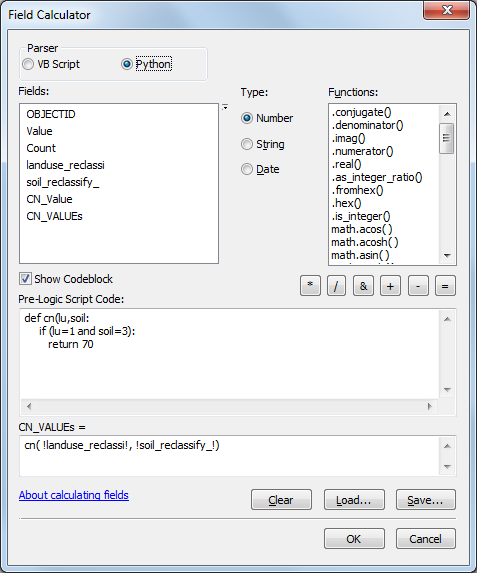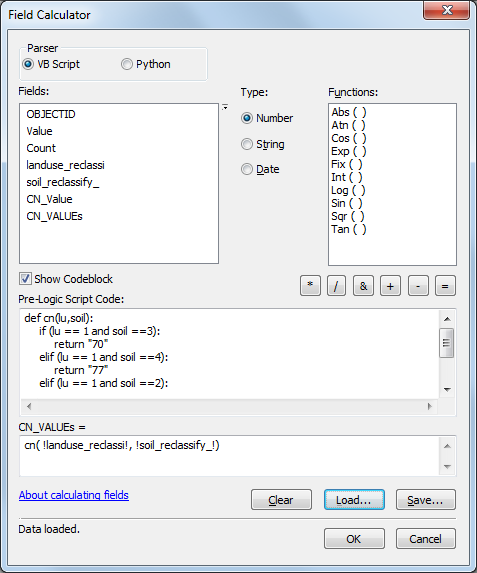- Home
- :
- All Communities
- :
- User Groups
- :
- Python Snippets
- :
- Questions
- :
- Re: Python in field calculator
- Subscribe to RSS Feed
- Mark Topic as New
- Mark Topic as Read
- Float this Topic for Current User
- Bookmark
- Subscribe
- Mute
- Printer Friendly Page
- Mark as New
- Bookmark
- Subscribe
- Mute
- Subscribe to RSS Feed
- Permalink
I have two fields: landuse classification numbers (1-5) and soil rating numbers (1-4). The values of the third field, CN values, depend on what numbers the other other two fields are. For example, if the landuse number is 1 and the soil rating number is 3, the CN value should be 70. I'm attempting to do this via python if-then statement in the field calculator but keep running in problems with it. The most common error message is that it has invalid parameters. Here is what I am trying. I'm completely new to python and would appreciate any help!!

Solved! Go to Solution.
Accepted Solutions
- Mark as New
- Bookmark
- Subscribe
- Mute
- Subscribe to RSS Feed
- Permalink
I figured it out and now it works like a charm! I started to continue with additional if statements but the difference was to use == instead of = and to use quotations around the return field.

- Mark as New
- Bookmark
- Subscribe
- Mute
- Subscribe to RSS Feed
- Permalink
I figured it out and now it works like a charm! I started to continue with additional if statements but the difference was to use == instead of = and to use quotations around the return field.

- Mark as New
- Bookmark
- Subscribe
- Mute
- Subscribe to RSS Feed
- Permalink
some syntactical errors
- missing a final ) in the def statement
- equality check is == , not = ... the later is an assignment statement
- I use & instead of 'and' ... prefer & but six of one... ( lu == 1) and (soil == 3)
- enclose conditions in ( ) juuuust to be sure
- always provide a return of some sort, otherwise it is a crap shoot
Ok format
>>> def cn(lu,soil): ... if (lu == 1) & (soil== 3): ... return 70 ... >>> lu = 1 >>> soil = 3 >>> cn(lu,soil) 70 >>>
better format (I don't share perfect ![]()
>>> def cn(lu,soil): ... if (lu == 1) & (soil== 3): ... val = 70 ... else: ... val = -999 ... return val ... >>> cn(1,4) -999 >>> cn(1,3) 70 >>>
- Mark as New
- Bookmark
- Subscribe
- Mute
- Subscribe to RSS Feed
- Permalink
^ missing final ) after "I don't share perfect" ![]()
- Mark as New
- Bookmark
- Subscribe
- Mute
- Subscribe to RSS Feed
- Permalink
It is those damn smiley faces...they corrupt the end of the line (![]() )
)
- Mark as New
- Bookmark
- Subscribe
- Mute
- Subscribe to RSS Feed
- Permalink
- always provide a return of some sort, otherwise it is a crap shoot
I like this suggestion from Dan Patterson. In addition Joshua Bixby recommends using one return for a single exit point (like Dan's "better format" code above), rather than having multiple returns. The Python Code Style agrees.
When a function grows in complexity it is not uncommon to use multiple return statements inside the function’s body. However, in order to keep a clear intent and a sustainable readability level, it is preferable to avoid returning meaningful values from many output points in the body.